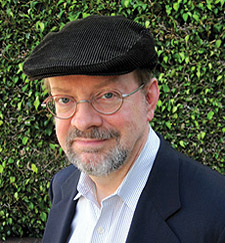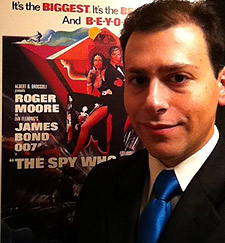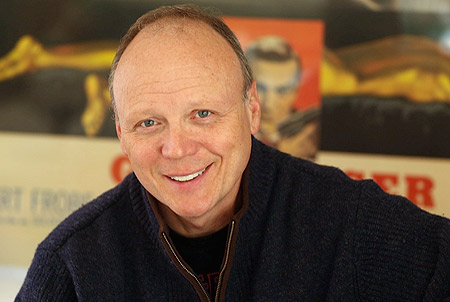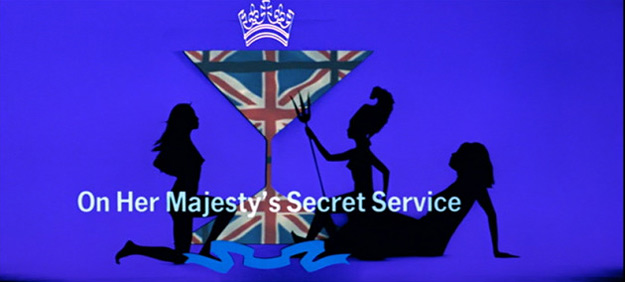“[T]he lasting impact of On Her Majesty’s Secret Service is that it showed that a James Bond film could be made without Sean Connery in the lead role. The producers maintained that audiences came to the films to see James Bond, not necessarily the actor playing him.” — Bruce Scivally
The Digital Bits is pleased to present this retrospective commemorating the 45th anniversary of the release of On Her Majesty’s Secret Service, the sixth cinematic James Bond adventure and, most notably, the first not to star Sean Connery as Agent 007. [Read more here...]
As with our previous 007 articles (available here and here), The Bits celebrates the occasion with this retrospective featuring a Q&A with an esteemed group of James Bond authorities who discuss the virtues and shortcomings of On Her Majesty’s Secret Service and why the passage of time has been particularly kind to this film more than any other in the long-running series. The interviews were conducted separately and have been edited into a “roundtable” conversation format.
Okay, let’s (alphabetically) meet the participants….
Jon Burlingame is the author of The Music of James Bond (Oxford University Press, 2012; and recently issued in paperback with an updated Skyfall chapter). He also authored Sound and Vision: 60 Years of Motion Picture Soundtracks (Watson-Guptill, 2000) and TV’s Biggest Hits: The Story of Television Themes from Dragnet to Friends (Schirmer, 1996). He writes regularly for the entertainment-industry trade Variety and has also been published in The Hollywood Reporter, Los Angeles Times, The New York Times, and The Washington Post. He started writing about spy music for the 1970s fanzine File Forty and has since produced seven CDs of original music from The Man from U.N.C.L.E. for the Film Score Monthly label.


Robert A. Caplen is an attorney and the author of Shaken & Stirred: The Feminism of James Bond (Xlibris, 2010). Based in Washington, DC, he practices antitrust and commercial litigation and has published numerous law review articles in leading academic journals. Shaken & Stirred: The Feminism of James Bond (which was quoted in Sir Roger Moore’s memoir, Bond on Bond) is his first book. He is working on a follow-up book and can be reached via Facebook (www.Facebook.com/bondgirlbook) and Twitter (@bondgirlbook).
James Chapman is a Professor of Film Studies at the University of Leicester and is the author of Licence to Thrill: A Cultural History of the James Bond Films (Tauris, 2007). His other books include Inside the Tardis: The Worlds of Doctor Who—A Cultural History (Tauris, 2006), Saints and Avengers: British Adventure Series of the 1960s (Tauris, 2002), and (with Nicholas J. Cull) Projecting Empire: Imperialism and Popular Cinema (Tauris, 2009). Chapman is also a Council member of the International Association for Media and History and is Editor of the Historical Journal of Film, Radio and Television.

John Cork is the author (with Bruce Scivally) of James Bond: The Legacy (Abrams, 2002). He also wrote (with Maryam d’Abo) Bond Girls Are Forever: The Women of James Bond (Abrams, 2003) and (with Collin Stutz) James Bond Encyclopedia (DK, 2007). He is the president of Cloverland, a multi-media production company, producing documentaries and supplemental material for movies on DVD and Blu-ray, including material for Chariots of Fire, The Hustler, and many of the James Bond and Pink Panther titles. Cork also wrote the screenplay to The Long Walk Home (1990), starring Whoopi Goldberg and Sissy Spacek. He recently wrote and directed the feature documentary You Belong to Me: Sex, Race and Murder on the Suwannee River for producers Jude Hagin and Hillary Saltzman (daughter of original Bond producer, Harry Saltzman); the film is now touring festivals.

Bill Desowitz is the author of James Bond Unmasked (Spies, 2012; www.jamesbondunmasked.com; and updated for Kindle which includes a chapter on Skyfall and exclusive interview with Sam Mendes). He is the owner of Immersed in Movies (www.billdesowitz.com), a contributor to Thompson on Hollywood at Indiewire and contributing editor of Animation Scoop at Indiewire. He has also contributed to the Los Angeles Times and USA Today.


Charles Helfenstein is the author of The Making of On Her Majesty’s Secret Service (Spies, 2009) and The Making of The Living Daylights (Spies, 2012).
Lee Pfeiffer is the author (with Philip Lisa) of The Incredible World of 007: An Authorized Celebration of James Bond (Citadel, 1992) and The Films of Sean Connery (Citadel, 2001), and (with Dave Worrall) The Essential Bond: The Authorized Guide to the World of 007 (Boxtree, 1998/Harper Collins, 1999). He also wrote (with Michael Lewis) The Films of Harrison Ford (Citadel, 2002) and (with Dave Worrall) The Great Fox War Movies (20th Century Fox Home Entertainment, 2006). Lee was a producer on the Goldfinger and Thunderball Special Edition LaserDisc sets and is the founder (with Dave Worrall) and Editor-in-Chief of Cinema Retro magazine, which celebrates films of the 1960s and 1970s and is “the Essential Guide to Cult and Classic Movies.”

Bruce Scivally is the author (with John Cork) of James Bond: The Legacy (Abrams, 2002). He has also written Superman on Film, Television, Radio & Broadway (McFarland, 2006), Billion Dollar Batman: A History of the Caped Crusader on Film, Radio and Television from 10¢ Comic Book to Global Icon (Henry Gray, 2011), and the forthcoming Dracula FAQ. As well, he has written and produced numerous documentaries and featurettes that have appeared as supplemental material on LaserDisc, DVD and Blu-ray Disc, including several of the Charlie Chan, James Bond, and Pink Panther releases. He teaches screenwriting, film production and cinema history and theory at The Illinois Institute of Art–Chicago and Columbia College.

And now that the participants have been introduced, might I suggest cueing up the On Her Majesty’s Secret Service soundtrack album and preparing a martini (shaken, not stirred, of course), and then enjoy the conversation with these James Bond authorities.
---
Michael Coate (The Digital Bits): In what way is On Her Majesty’s Secret Service worthy of celebration on its 45th anniversary?
Jon Burlingame: On Her Majesty’s Secret Service is without a doubt one of the all-time great Bond films. It’s been fashionable for a long time to complain about it because of George Lazenby’s one-shot take on 007, but that ignores the impressive accomplishments of the movie in every other respect, from script to direction to locations to music. It’s still a masterpiece.
Robert A. Caplen: On Her Majesty’s Secret Service is worthy of praise for imbuing the series with a more humanistic approach, depicting the vulnerability of James Bond as he falls in love with and mourns the death of Tracy di Vicenzo. While the film has garnered significant criticism, it endures and remains entertaining. And, with SPECTRE on the horizon in 2015, there is a possibility, unless I read too much into the SPECTRE teaser art, that OHMSS could experience a renaissance.
James Chapman: All Bond movies are worth celebrating, though On Her Majesty’s Secret Service is a special case as it’s unique in the Bond series. I think for a long time it was the black sheep of the Bond family, the one film in the series that was supposedly a failure. Let’s put that one to bed straight away. OHMSS was a failure only in so far as it was less successful at the box-office than the previous four Bond movies; it was still one of the biggest-grossing films of 1970 and was the top box-office attraction in Britain. And when I looked at the critical reception when I was researching my book on the Bond movies, I found that, while the reception was mixed, it was no more mixed than the response to Dr. No—in fact, some critics thought it was an improvement on Thunderball and You Only Live Twice.
This is a cliché, but it’s a film that improves every time I watch it. It’s the closest of all the films to the source, and, while I don’t think that fidelity to Fleming is necessary for a great Bond movie (viz. The Spy Who Loved Me or Skyfall), I think that a lot of the qualities I like in OHMSS are from the book. I’m glad they kept the ending, for example. In fact, I think it’s the downbeat ending that was probably responsible for the film’s lesser performance at the box-office than George Lazenby, who became something of a whipping boy after the event and carried the can for its supposed “failure.” It’s an old film industry adage that a happy ending doubles the box-office. As Molly Haskell said in her review of the film for Village Voice: “If you like your Bonds with a happy ending, don’t go.”
John Cork: Majesty’s holds an almost magical significance for many Bond fans, particularly the fans of my generation. The cinematic Bond has always tread this fine line between absurdist spectacle, nearly mythic storytelling and this sense that there is something a bit more human going on at the heart of Bond than meets the eye. We can love Bond battling Dr. No in a nuclear reactor as fuel rods are melting down, but that is balanced by the cold resignation of Bond shooting Professor Dent and listening to Honey describe murdering the man who raped her. But just four and a half years later with You Only Live Twice, the human element had all but evaporated. Did we really care if Aki is killed? Sure, YOLT is a fun film—great score, lovely locations—but it lacks any of the soul of literary 007. Majesty’s was a big, strange bet on Ian Fleming’s Bond, and in so many ways (and fans will hate that I say this) it failed. It almost killed the Bond franchise. Yet, I would argue it stands shoulder to shoulder with Goldfinger as the most influential Bond film in the series. How this happened is a remarkable story.
After OHMSS aired on ABC, fans were outraged at the way the film had been re-cut for the two-night run, with voice-over from an actor who was clearly not George Lazenby. Those who remembered the film well were very vocal in defending the movie. Richard Schenkman, president of the James Bond Fan Club in the US confronted Cubby Broccoli about it personally in 1977. Cubby was again questioned about it publically at a retrospective at the Museum of Modern Art in 1979. There were soon two drumbeats that became constant in the fan community: one was about Kevin McClory’s attempt to remake Thunderball, and the other was about how OHMSS was the forgotten, underrated Bond film, and how the things that made it great were the very things missing in the Roger Moore Bond movies of the 70s.
After the success of Moonraker, Michael G. Wilson became a much more important creative partner in the series, and he tried to bring the Bond series back to Fleming and very much to setting the clock back to 1970. If you think of For Your Eyes Only almost as a sequel to OHMSS, you will get the idea. There’s Bond at Tracy’s grave. There’s Blofeld wearing the neck brace. The film is grounded in reality. Looking beyond that, we see the action scenes remind us of OHMSS—the skiing, the bobsled, the fight on a beach, the mountaintop lair. Before John Glen was tapped to direct the film, Eon reached out to Terence Young, who said no, and to Peter Hunt, the director of OHMSS. Hunt had other commitments and grave misgivings about going back to Bond at that point.
And after For Your Eyes Only, there is this continual battle over how much of the Fleming Bond is going to be present in the cinematic Bond, and, even more importantly, how that will be portrayed. The tone of Majesty’s is a strong and direct influence on Licence to Kill. It played a big role in the development of The World Is Not Enough. The shadow of Majesty’s permeates every bit of the Daniel Craig Bond films, and Eon’s buy-out of McClory’s rights ensures that the filmmakers can work with that part of Bond’s literary history again.

Bill Desowitz: On Her Majesty’s Secret Service is a landmark Bond movie in so many ways: the first without Sean Connery; the sole appearance by newbie actor George Lazenby; the first and only directorial effort of editor Peter Hunt; the most faithful Fleming adaptation; a return to the lean, mean espionage of From Russia with Love; the first movie centered on Bond and falling in love with Tracy, played engagingly by Diana Rigg (who left The Avengers); the best action in the snow in franchise history; the most haunting score by John Barry; and the most devastatingly tragic finale with the murder of Tracy by Blofeld and his assistant, Irma Bunt.
Charles Helfenstein: It is the crown jewel of the James Bond series. Somewhat ignored and dismissed after its initial release, the film has enjoyed a well-deserved renaissance. It is a masterpiece, and those who ignore it just because of George Lazenby are missing out on something incredibly special…Ian Fleming’s world perfectly captured on film.
Lee Pfeiffer: The stature of OHMSS among critics and the public has risen appreciably since the film was released in 1969. At the time, virtually any film that followed the Connery era would have been met with derision. The film was not judged fairly, though hardcore Bond fans seemed to like it. The fact that the film grossed far less than the Connery Bonds also added to the mistaken notion that it was a dud. Lazenby did himself no favors by announcing he was quitting the role after one film, so critics could be excused for predicting that the Bond era was over. Yet, it’s precisely because of the oddball, one-off nature of the film that it resonates as one of the best entries in the series. Most of the credit has to go to Peter Hunt, who had edited the early Bond films. This was his directorial debut and it must have been a very sobering challenge for him to undertake a big-budget film with such high expectations. Hunt was determined to revitalize the series by thinking outside of the box. He correctly presumed that the series could not go any further into gadgetry and spectacle, especially in the wake of You Only Live Twice, which is a marvelous film but one that finally soured Connery completely in regard to playing 007. His criticism was well-founded: Bond was becoming a less interesting character and simply a catalyst for big action sequences. Hunt once told me that he felt by this point, Bond was simply a guy who presses a few buttons to utilize gadgets to get out of a jam. Hunt wanted to go back to the essence of Fleming’s novels, and he succeeded admirably. OHMSS is a thinking man’s Bond flick in the way that From Russia with Love was. There was a lot of tension during the making of the film. Hunt and Lazenby barely spoke. The producers, Broccoli and Saltzman, not only had troubles between themselves, but they were understandably upset that their new investment—George Lazenby—would not be doing another film. (It’s the only movie where “James Bond 007” gets above-the-title billing instead of the lead actor. Why promote someone who was moving on from the role?) There was also controversy about the running time of the movie with some of the “suits” arguing that it needed to be cut. But Peter Hunt stood his ground. The film was still successful financially but not nearly as much as its predecessors. Yet, its qualities have only grown with time and people have taken a much more mature attitude evaluating its merits.



